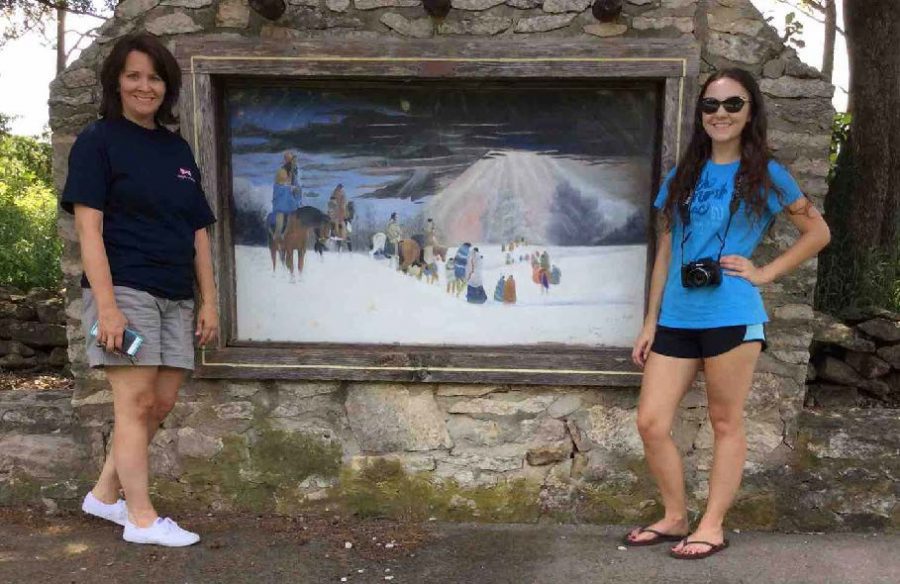
Burnett family member Tracy Locke is deeply invested in her heritage even though she lives in Lafayette, Indiana, hundreds of miles away from Citizen Potawatomi Nation headquarters. Lafayette is one of the stops the Potawatomi made on the Trail of Death in 1838. In fact, she is a descendant of Abram Burnett, who was 26 years old at the time and worked as an interpreter on the trail.
Locke is secretary of the Trail of Death Association and co-organizer of the 2018 Trail of Death caravan trip. Once every few years, a group of 20 to 40 tribal members takes a weeklong journey along the route their ancestors traveled from Twin Lakes, Indiana, to Sugar Creek, Kansas. Along the way, they stop at each marker, read from the diary of Father Benjamin Petit and spend time with the other travelers.
“Some of the different historical societies will host a dinner for us,” Locke said. “Sometimes people in the community will come and meet with us to tell us stories that have been passed down from ancestors who witnessed the Natives being removed.”
Spiritual journey
More than 850 Potawatomi traveled the Trail of Death between Sept. 4 and Nov. 10, 1838. The U.S. government removed the Potawatomi from ancestral land in Indiana, and they marched all the way to a reservation in Sugar Creek, Kansas. The trek crossed four states, lasted more than two months and resulted in the death of 41 people, more than half of whom were children
Locke has never journeyed the entire length of the Trail of Death before, but she and her daughter Erin Locke traveled to Sugar Creek before the 2016 Gathering of Potawatomi Nations in Shawnee, Oklahoma. She said their experience was “spiritual” and “sad” and evoked “heavy hearts.”
“I took my daughter because she’s been involved in the Trail of Death Association, and I’ve told her about the Trail of Death since she was little,” Locke said. “It gave her a little bit of an idea of what it was like for Abram Burnett and the other Potawatomi that were on the trail.
“Since we live near the beginning, I thought it was important to take her out to Sugar Creek and show her that end of it. We saw the difference in the land and topography, which made a larger impact on her rather than only telling her stories.”
Tribal liaison
In addition to serving on the Trail of Death Association board, she was also appointed by then-Governor of Indiana Mike Pence to serve on the Native American Indian Affairs Commission, which distributes the funds from the Native American license plate sales in Indiana.
“It has been an honor to serve on the commission,” she said. “We’re the go-between the state and the Native communities, so we research and talk to the Natives living in Indiana to find out what their needs are and where they would like to see the money spent.”
Commission projects she’s worked on include coordinating with the Indiana Department of Natural Resources to allow tribal members to plant and harvest materials for ceremonial purposes on DNR land, reimbursing tribal members for hunting and fishing permit fees, implementing grants for teachers to take classes on approved Native American-focused field trips, and creating vocational school scholarships.
Locke said one of the education committee’s goals is to provide resources via its website, in.gov/inaiac, so that teachers can access accurate cultural information about Native Americans.
Since she her appointment three years ago, the commission has created four scholarships and distributed $30,000 to students who belong to the Miami Nation of Indiana or a federally recognized tribe and who attend an Indiana state college or university. As the education committee chairwoman, she said she is most proud of its work in furthering the education of Native American students.
Preserving the future
“I think that we are one generation away from losing everything — our stories, the lessons and things we can learn from what our ancestors went through,” Locke said. “I’m very passionate about the next generation being educated, culturally correct and taking over. I’ve had my own daughter attend Potawatomi language classes since she was very young.”
Locke’s 18-year-old daughter is studying communications at Purdue University and has her sights set on law school. Locke believes that teaching her daughter about her heritage from a young age is important, even though it is challenging subject matter.
“When our people were removed and had everything taken away from them, it’s a testimony of survival and strength. I want her to get strength through that too,” she said. “I think that it’s really helped to mold her into the person that she is today, and it’s made her strong. I want her to be able to talk about her culture correctly, or if she hears somebody talking about it incorrectly, she can explain the truth.”
Locke anticipates the 2018 Trail of Death caravan will be a moving experience and “one that she won’t soon forget.” For more information, contact Locke at tracy.locke@comcast.net or visit the Potawatomi Trail of Death 2018 Caravan Facebook page.
